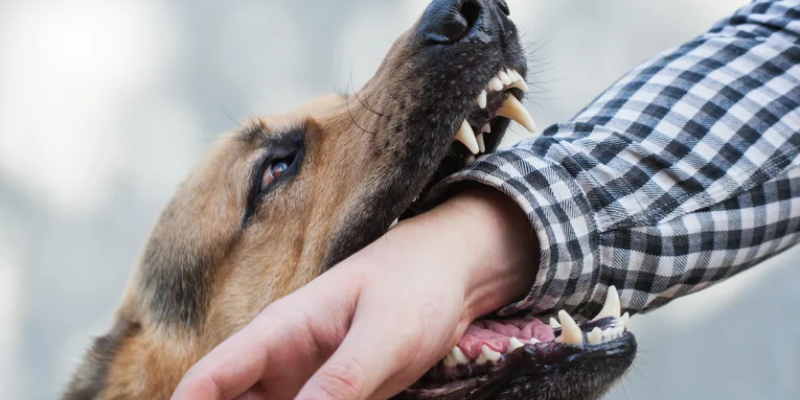Welcoming a furry companion into your home brings immense joy, enriching family life with endless affection and playful moments. However, as responsible pet owners, it is equally important to acknowledge the potential liabilities that come with having a dog, particularly the risk of dog bites. Many individuals living in rental properties often ponder a critical question: does renters insurance cover dog bites? In this article, Goldnews24h will accompany you to explore the nuances of renters insurance, clarifying how it addresses dog bite incidents and offering essential insights to safeguard your family’s financial well-being. Our goal is to provide objective and transparent knowledge, helping you navigate the complexities of insurance and make informed decisions based on actual needs.
Understanding Renters Insurance Liability Coverage

Renters insurance is a fundamental component of personal financial protection for anyone living in a rented home or apartment. Beyond covering your personal belongings against theft or damage, a crucial aspect of this coverage is personal liability. This protection is designed to shield you.
What is personal liability coverage?
Personal liability coverage within a renters insurance policy provides financial protection if you or a member of your household accidentally cause bodily injury or property damage to another person. For instance, if a guest slips and falls inside your rented apartment, or your child accidentally breaks a neighbor’s expensive window, this coverage can help pay for the resulting medical bills, repair costs, and legal fees if a lawsuit is filed against you. The intent is to cover unforeseen accidents for which you are deemed responsible, preventing these incidents from leading to devastating out-of-pocket expenses. This core component forms the basis for how pet-related incidents, including dog bites, are often addressed.
How liability limits work
Every renters insurance policy comes with specific liability limits, representing the maximum amount your insurer will pay for covered claims. Common liability limits often range from $100,000 to $300,000, though higher options are typically available for increased protection. It is crucial to select a limit that adequately reflects your assets and potential risks, as any costs exceeding this limit would become your personal responsibility. For example, if a dog bite claim results in $150,000 in medical expenses and legal fees, but your policy has a $100,000 limit, you would be liable for the remaining $50,000. This highlights the importance of reviewing and potentially increasing your liability coverage to ensure comprehensive financial security.
The Specifics: Does Renters Insurance Cover Dog Bites?

A common and pressing concern for pet owners is whether their renters insurance will offer protection if their dog bites someone. Generally speaking, yes, renters insurance policies typically include coverage for dog bites under their personal liability section. This means if your dog injures a guest or a stranger, your policy can help cover the resulting medical expenses, legal fees, and potential settlements or judgments if you are sued. However, the extent and availability of this coverage can vary significantly based on specific policy terms and the insurer.
Typical coverage for dog bite incidents
When a renters insurance policy covers a dog bite incident, it primarily provides for several key financial aspects. First, it helps pay for the injured party’s medical treatment, which can include emergency care, doctor visits, medication, and even reconstructive surgery, which can be very expensive. Second, if the incident leads to a lawsuit, the liability coverage typically assists with legal defense costs, regardless of the outcome. Third, should a settlement or judgment be reached, the policy can cover these amounts up to the specified liability limits. This comprehensive coverage is designed to protect dog owners.
Factors influencing coverage
While the answer to “does renters insurance cover dog bites” is often yes, several factors can influence whether your specific policy will provide coverage. One of the most significant considerations is the breed of your dog, as many insurers have lists of restricted or excluded breeds due to perceived higher risk. Additionally, a dog’s prior bite history can heavily impact coverage; an insurer may deny coverage, charge a higher premium, or even non-renew a policy if a dog has previously bitten someone. Furthermore, the location of the incident, whether on or off your rented premises, can sometimes affect coverage terms, though many policies extend protection beyond your home.
Common Exclusions And Limitations To Be Aware Of

While renters insurance often provides a crucial safety net for dog bite incidents, it is vital for pet-owning renters to be fully aware of potential exclusions and limitations within their policies. These caveats can significantly impact whether a claim is covered, potentially leaving you exposed to substantial out-of-pocket costs. Understanding these restrictions is key to avoiding unpleasant surprises and ensuring you have the appropriate level of financial protection. Carefully reviewing your policy documents and discussing any concerns with your insurance agent is always a recommended practice.
Breed-specific exclusions
Perhaps the most common limitation regarding dog bite coverage is breed-specific exclusions. Many insurance companies maintain lists of dog breeds they consider “high-risk” due to statistical data regarding bite frequency or severity. Breeds commonly found on these exclusion lists include Pit Bulls, Rottweilers, German Shepherds, Doberman Pinschers, Huskies, Akitas, Chow Chows, and Mastiffs, among others. If you own a dog on your insurer’s restricted list, your policy may explicitly state that it will not cover any incidents involving that particular breed, or coverage might be severely limited. In some cases, insurers may even decline to issue a policy altogether. It is essential to declare your dog’s breed when applying for insurance to ensure transparency and avoid future claim denials.
Prior bite history
Another critical factor that can lead to coverage limitations or denials is a dog’s prior bite history. If your dog has bitten someone in the past, even if it was a minor incident, insurers may view it as an increased risk. This “one-bite rule” can make it challenging to obtain or maintain standard liability coverage for dog bites. An insurance company might respond by charging a higher premium, adding a specific endorsement that excludes coverage for future incidents involving that dog, or even deciding not to renew your policy. Some insurers might offer coverage if the dog undergoes behavior modification training or is always restrained, but these are exceptions rather than standard offerings.
Business-related activities
It is important to note that renters insurance is designed for personal liability, not business liability. If your dog is involved in any business-related activities, such as being used for security, breeding, dog walking services, or any other commercial purpose, your standard renters insurance policy will most likely not cover incidents that occur during these activities. This exclusion is a common feature across various insurance types, as business-related risks require specialized commercial liability insurance. Renters who use their dogs for professional endeavors should seek out appropriate commercial insurance solutions to ensure adequate protection.
Intentional acts and criminal behavior
Insurance policies are generally designed to cover accidental occurrences, not intentional harm. If a dog bite incident is found to be the result of an intentional act by the owner, such as provoking the dog to attack, liability coverage will almost certainly be denied. Similarly, if the incident occurs during the commission of a crime or involves criminal behavior on the part of the policyholder, coverage exclusions typically apply. This reinforces the principle that insurance protects against unforeseen accidents and negligence, not deliberate harmful actions or illegal activities.
Navigating The Claims Process For Dog Bites
Understanding the steps involved in a dog bite claim is crucial for any pet owner, particularly when considering the question of does renters insurance cover dog bites. A structured approach to handling the aftermath of an incident can significantly impact the success and efficiency of your insurance claim. Being prepared can help ensure that both the injured party receives necessary care and that your financial obligations are managed effectively through your policy. Timely action and thorough documentation are paramount in these situations.
Immediate steps after an incident
If your dog bites someone, the immediate priority is to ensure the safety and well-being of all parties involved. First, secure your dog to prevent any further incidents. Second, seek immediate medical attention for the injured person, even if the injury appears minor. Medical records will be a crucial part of any potential claim. Third, gather information.
Reporting the claim to your insurer
Once the immediate situation is stable, you should promptly report the dog bite incident to your renters insurance provider. Timely notification is essential, as most policies require claims to be reported within a specific timeframe. Provide your insurer with all the details you gathered, including the injured party’s information, a factual account of the circumstances, and any medical treatment received. Your insurance company will open a claim and likely assign a claims adjuster to investigate the incident. Cooperation with your insurer by providing accurate and complete information is vital for a smooth claims process. This transparency helps the adjuster evaluate the claim fairly and efficiently.
Understanding the investigation and settlement
After reporting the claim, your insurance company will conduct an investigation to determine liability and the extent of damages. This may involve interviewing you, the injured party, and any witnesses, as well as reviewing medical records and photographs. The insurer will assess whether the incident falls within the scope of your policy’s liability coverage, taking into account any exclusions or limitations, such as breed restrictions or prior bite history. Once the investigation is complete, the insurer will negotiate with the injured party or their legal representative to reach a settlement. The goal is to resolve the claim fairly within your policy’s limits, covering medical expenses, lost wages, and potentially pain and suffering.
Why Dog Bite Liability Is Crucial For Renters
The question, “does renters insurance cover dog bites,” is not merely a technicality but a critical inquiry into protecting your financial future. Owning a dog brings immense companionship, yet it also carries significant responsibilities and potential liabilities that, if left unaddressed, can lead to severe financial strain. For renters, who may not have the extensive liability coverage often associated with homeowners insurance, understanding and securing adequate dog bite liability coverage is an indispensable aspect of comprehensive risk management. It provides a vital layer of security, ensuring that an unforeseen incident does not jeopardize your assets or your family’s stability.
The financial impact of a dog bite claim
The financial repercussions of an uncovered dog bite incident can be staggering. Dog bite claims consistently rank among the most expensive liability claims for insurers. In 2023, the average dog bite liability claim cost over $58,000, and this figure rose to $69,272 in 2024. These costs include not only immediate medical expenses, such as emergency room visits, stitches, and antibiotics, but also potential long-term care, reconstructive surgeries, physical therapy, and psychological counseling. Beyond medical costs, legal fees can quickly accumulate if a lawsuit is filed, adding another layer of financial burden. Without adequate renters insurance, these expenses would fall entirely on the dog owner, potentially leading to bankruptcy or the forced sale of assets.
Peace of mind for pet owners
Beyond the purely financial considerations, knowing that your renters insurance provides protection for dog bite liability offers invaluable peace of mind. Pet owners invest emotionally in their animals, and the thought of their beloved companion causing harm to another person can be deeply distressing. Having insurance coverage means that should an unfortunate incident occur, you are better prepared to handle the fallout responsibly and compassionately. It allows you to focus on the well-being of the injured party and your dog, rather than being overwhelmed by crippling financial worries. This peace of mind is a core value of insurance: managing risk so you can live confidently.
Choosing The Right Renters Insurance Policy For Pet Owners
Selecting the right renters insurance policy is a proactive step toward responsible pet ownership. Given the complexities surrounding dog bite liability, it is paramount to choose a policy that not only meets your basic coverage needs but also specifically addresses the potential risks associated with having a dog. A thorough evaluation of policy documents, careful comparison of options, and consideration of an insurer’s reputation are all vital elements in securing comprehensive protection. This diligence ensures that you are adequately prepared for any unforeseen circumstances, including whether does renters insurance cover dog bites under your specific terms.
Reviewing policy documents carefully
The most crucial step in ensuring adequate dog bite coverage is to meticulously review your renters insurance policy documents. Pay particular attention to the personal liability section and any clauses pertaining to pets or animals. Look for explicit language regarding dog bite liability, breed exclusions, or any limitations based on your dog’s history. If the policy document is unclear, do not hesitate to ask your insurance agent direct and specific questions. Inquire about how your particular dog breed is handled, what specific scenarios are covered or excluded, and whether there are any options to add endorsements for broader pet liability coverage. A clear understanding of these details upfront can prevent significant issues down the line.
Comparing coverage limits and premiums
When shopping for renters insurance as a pet owner, it is essential to compare not only the premiums but also the liability coverage limits offered by different providers. As discussed, dog bite claims can be very costly, with average payouts often exceeding $50,000. While a policy with a $100,000 liability limit might seem sufficient, considering higher limits, such as $300,000 or even $500,000, can offer more robust protection against substantial claims. Additionally, inquire about umbrella insurance policies, which provide an extra layer of liability coverage above your standard renters insurance, offering millions in additional protection for a relatively modest cost. Balance the premium cost with the peace of mind and financial security that higher coverage limits can provide.
Researching company reputation
The financial strength and claims-handling reputation of an insurance company are vital considerations, particularly for liability coverage. Before committing to a policy, research the insurer’s ratings.
Conclusion
Understanding whether does renters insurance cover dog bites is an essential aspect of responsible pet ownership for anyone living in a rental property. While most renters insurance policies generally include dog bite liability coverage under their personal liability component, it is crucial to be aware of the specific terms, conditions, and potential exclusions that can vary significantly between insurers. Factors such as breed restrictions, a dog’s prior bite history, and the exact circumstances of an incident can all impact coverage. Goldnews24h strongly advises all pet-owning renters to thoroughly review their current policies, ask detailed questions of their insurance providers, and consider higher liability limits or supplemental policies like umbrella insurance. Proactive engagement with your insurance coverage ensures you are adequately protected against unforeseen liabilities, providing peace of mind and safeguarding your financial future. Do not leave your family’s security to chance; take the necessary steps to secure comprehensive renters insurance today.

